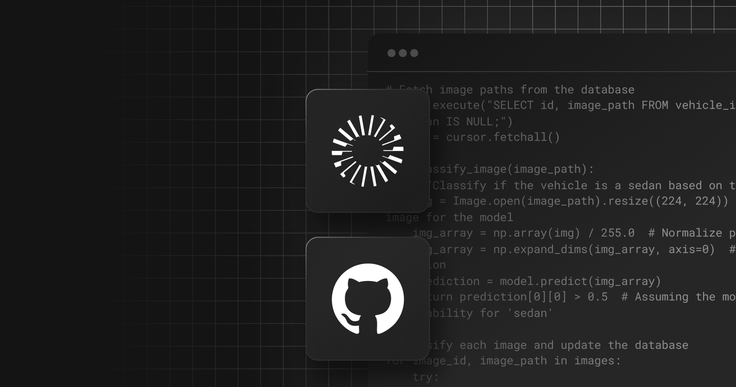
At SingleStore, we're constantly working to improve the developer experience within our platform. Today, we're excited to announce a powerful new feature that many of you have been requesting: GitHub integration for notebooks.
.png?width=1024&disable=upscale&auto=webp)
Bridging Two Worlds
Data scientists and developers often live in two worlds. On one side, there's the interactive notebook environment where you explore data, build models, and visualize results. On the other side, there's your version control system where you track changes, collaborate with teammates, and maintain production code.
Until now, these worlds remained largely separate in the SingleStore Portal. While our built-in version history feature provides a safety net for experimentation, we want to extend it to include the robust collaboration workflows that professional development teams need.
Our new GitHub integration bridges this gap, bringing familiar Git workflows directly into your notebook environment.
Why GitHub Integration Matters
Version control is fundamental to modern software development, but notebooks present unique challenges. Their interactive nature and mix of code, markdown, and outputs don't always fit neatly into traditional version control workflows.
By integrating GitHub directly into the SingleStore Portal, we're addressing several key needs
Collaboration: Now teams can review each other's notebook changes through pull requests, leave comments, and maintain quality standards through code reviews.
Reproducibility: With proper version control, you can ensure that anyone can reproduce your notebook's results by running the exact same version of your code.
Traceability: Track the evolution of your analysis over time, understanding not just what changed but why it changed through commit messages. Also unlike in-portal limit on version in version history feature you will in theory have unlimited number of versions to fall back to.
Workflow Integration: Connect your notebook development to your existing CI/CD pipelines and development processes.
How To Get Started
Ensure that the Github Integration option is enabled for your Org. We've designed the GitHub integration to be intuitive, focusing on the most common Git operations while keeping the interface clean and simple.
Connecting to GitHub
Select integration from going to your Account Drop Down menu
When you open the Integrations menu item under your organization name, you'll see a new GitHub icon.
Toggle the Github Integration icon to connect your github account
Login to Github with your preferred login credentials
Select the Repositories and the permission that you want to share with this integration
After authorization is successful you should see your github account listed in the portal
Now to load a notebook to Data Studio Select “Import from Github” in the + New Notebook Dropdown list
Select the Repository, github branch of the target notebook you want to import and Click on import
Pushing a Change to GitHub
After making changes to your notebook, you'll see familiar Git workflows available right within the interface. Let's test it.
Update the content of the notebook
Click Commit & Push button in the Github Panel to view the diff with remote.
Confirm commit & Push to enter the commit message and appropriate Branch name
Staying in Sync
The integration automatically checks if your notebook is out of sync with the remote repository when you open it or after periodic poll intervals. A subtle indicator lets you know when there are changes to pull, helping you avoid merge conflicts and ensuring you're always working with the latest version. Let's see this in action.
Make changes in Github remote in a notebook that is synced with SingleStore Portal Notebook
Head over to the Portal and check the github panel to see that the changes are no longer synced. If the Out of Sync indicator is not triggered automatically , click on refresh sync 🔄 button.
Now you can bring in the changes from Remote with a single click of Fetch button in the diff viewer.
You will be prompted to Confirm & Overwrite the Portal Notebook with remote changes.
Real-World Workflows
Let's look at how this integration enhances some common data science workflows:
Experiment Tracking: Create a new branch for each experimental approach, commit incremental changes, and merge successful experiments back to your main branch.
Peer Review: Submit your analysis for review by creating a pull request, allowing teammates to comment on specific cells and suggest improvements.
Collaboration: Multiple team members can work on different aspects of an analysis in separate branches, then integrate their work through GitHub's merge capabilities.
Production Deployment: Once your notebook analysis is ready for production, your DevOps team can pull the final version from GitHub into automated deployment pipelines.
Looking to the Future
This GitHub integration is just the beginning of our vision for a more connected and flexible development environment. We're actively exploring several exciting enhancements:
We're working on a comprehensive file and folder organization system with proper role-based access controls. This will expand beyond notebooks and SQL files to support a wider range of file types, giving you more flexibility in how you structure your projects.
Perhaps most exciting, we're exploring the possibility of replacing our current Jupyter fork that powers our notebooks with our own fork of Online Visual Studio Code editor. This would dramatically expand language support beyond Python and SQL, while bringing the rich ecosystem of VS Code extensions directly into the SingleStore environment.
These future developments will transform the SingleStore Portal from a specialized data analysis environment into a complete development platform that supports your entire workflow starting from exploration all the way to production.
We can't wait to see how this integration enhances your workflow and enables new forms of collaboration. As always, we welcome your feedback as we continue to refine and expand this feature. What GitHub-based workflows are you most excited to bring to your notebook development?
Frequently Asked Questions



-for-Real-World-Machine-Learning_feature.png?height=187&disable=upscale&auto=webp)











